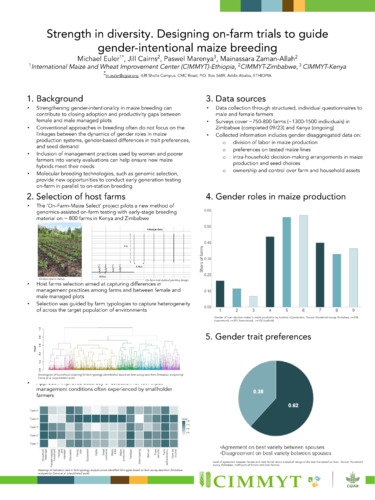Strength in diversity: Designing on-farm trials to guide gender-intentional maize breeding
Abstract
Strengthening gender-intentionality in maize breeding is one potential pathway to closing improved variety adoption and productivity gaps between femaleand male-managed maize plots, and to foster social inclusion in agricultural development. The breeding of gender-intentional maize varieties requires a better understanding of the dynamics of gender roles in maize production systems, gender-based differences in trait preferences and maize seed demand. Despite a growing number of studies, the evidence on genderdifferentiated preferences for maize varieties remains inconclusive. This study uses data from on-farm trials with Stage 1 maize breeding material conducted on 800 smallholder farms in Kenya and Zimbabwe to assess how dynamics in gender roles in maize production affect gender-differentiated preferences for tested maize lines on-farm. On-farm trials with earlystage breeding material allow capturing spatial and temporal heterogeneity across target population of environments, including differences in management practices among farms and between female- and malemanaged plots. Preferences for agronomic and enduse traits, and gender roles in maize production were collected through individual surveys with the female and male household heads. We hypothesize that there are gender-based differences in preferences for tested maize lines, and that these differences are mediated by socioeconomic and agro-ecological context variables, as well as biotic and abiotic stress factors experienced during the growing season. Results are expected to guide product development of regional maize breeding programs, and to strengthen their adaptation to changing maize-growing environments in sub-Saharan Africa.

